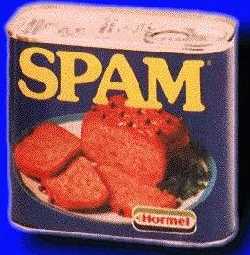 SKC Films Library SKC Films Library |
| |
| SKC Films Library >> Technology >> Home Economics >> Cookery |
| SPAM® the canned meat product that people love to hate
George A. Hormel founded what is now the Hormel Foods Corporation in 1891, at a time when five Chicago-based meatpackers dominated the meat industry. By focusing his company's efforts on just one meat (pork), emphasizing quality over quantity, and encouraging innovation, he overcame the handicap of being located in a small town and built his company into a major player in the industry. By the time he took over as president of his father's company in 1927, Jay C. Hormel had already been responsible for the biggest innovation in the meatpacking industry -- canned meat. Introduced in 1926, Hormel Canned Ham soon became a successful product and gave Hormel much needed brand recognition, but it also left Jay Hormel with a new problem to solve -- what to do with the thousands of pounds of pork shoulder that had to be cut off the hams to get them in the cans. After years of trial and error, Hormel's innovators came up with a canned, minced pork and ham loaf that required no refrigeration. To market the new product, Hormel sponsored a naming contest at a 1936/37 New Year's Eve party. The winning entry was "SPAM," for which actor Kenneth Daigneau, who also happened to be the brother of the company's vice-president, was awarded $100. Hormel registered a trademark for the name on May 11, 1937, and an iconic food was born. By prominently featuring the brand name on the packaging and spending lavishly on advertising, Jay Hormel's new product achieved an 18 percent market share within a year. It was World War II that cemented its place in American food history, however. Before the United States entered the war, SPAM was one of the foods shipped to Allied countries as part of the lend-lease program, and when U.S. soldiers went to Europe and the Pacific they carried SPAM in their K-rations. Most of the SPAM eaten by soldiers was actually government meat that was canned by Hormel and other companies that were under contract to the military. Although only a relatively few soldiers received the genuine product, it was SPAM that they came to know and hate. The widespread dislike probably had less to do with the actual taste of SPAM, however, than with how often they were forced to eat it. No soldier was immune from the "curse" of eating SPAM, not even General Dwight D. Eisenhower, Commander of Allied Forces in Europe. Regardless of their opinion on SPAM during the war, soldiers who returned to the United States when the war was over brought a taste for it home with them. With the aid of an advertising blitz, SPAM sales increased after the war, and the product is still going strong today. Part of SPAM's longevity has to do with the joy many people take in making fun of the product. In fact, one of the most important moments in SPAM history happened in 1970, when it figured prominently in a segment of the British sketch comedy show "Monty Python's Flying Circus." Loved by some, despised by others, SPAM is still one of the most recognizable brand names in the world. It even has its own website, www.spam.com. |
| SKC Films Library >> Technology >> Home Economics
>> Cookery This page was last updated on May 11, 2017. |
